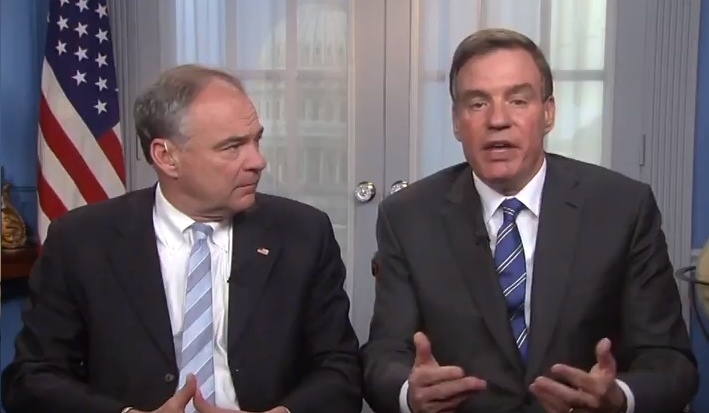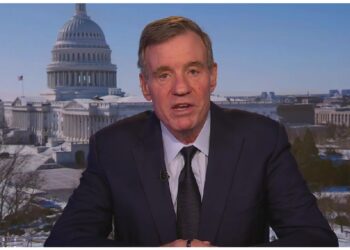From Senators Warner and Kaine:
WARNER & KAINE APPLAUD BIPARTISAN APPROPRIATIONS BILL PASSED BY SENATE
~ Package includes funding for Metro, Chesapeake Bay cleanup, and new Virginia tribes ~
WASHINGTON – Today, U.S. Sens. Mark R. Warner and Tim Kaine (both D-VA) applauded Senate passage of bipartisan legislation to fund federal programs under the Department of Transportation (DOT), Department of Housing and Urban Development (HUD), Department of the Treasury (USDT), Department of Agriculture (USDA), and the Department of Interior (DOI).
On a bipartisan 92-6 vote, the Senate approved the Fiscal Year 2019 appropriations package that covers funding for Transportation, Housing, and Urban Development (THUD); Agriculture, Rural Development, Food and Drug Administration; Interior and Environment; Financial Services and General Government; and all of their related agencies. The bill will now go to conference where it will be reconciled with a version passed by the House of Representatives.
“This bipartisan package maintains key Virginia priorities and pushes back against the Administration’s attempts to impose draconian cuts to vital federal programs,” said the Senators. “The bill keeps federal commitments to help fund the Metro system, which is critical to the capital region, and maintain cleanup efforts for the Chesapeake Bay. In addition, these funds will help expand broadband access to rural communities in Virginia and provide support to the six Virginia tribes that earned federal recognition this year so they can finally access the services and benefits they are owed.”
The following list includes many of the provisions Sens. Warner and Kaine advocated for on behalf of Virginia that were included in the appropriations package:
· WMATA: The bill includes the full federal funding of $150 million for Washington Metropolitan Area Transit Authority (WMATA) capital improvement. Warner and Kaine previously urged Senate appropriators to fund WMATA at authorized levels.
· Virginia Tribes: Earlier this year, Congress passed and the president signed into law the Thomasina E. Jordan Indian Tribes of Virginia Federal Recognition Act of 2017, legislation introduced by Sens. Warner and Kaine which for the first time granted federal recognition to six Virginia tribes: the Chickahominy, the Eastern Chickahominy, the Upper Mattaponi, the Rappahannock, the Monacan, and the Nansemond. The appropriations bill provides $1.12 million to largely help these Virginia tribes access the benefits and resources now available to them after their successful, decades-long effort to secure federal recognition.
· Chesapeake Bay: The bill provides $73 million for the Chesapeake Bay Program, a regional partnership that directs and conducts the restoration of the Chesapeake Bay. It also includes $2.02 million for the Chesapeake Bay Gateways and Water Trails Network, which helps increase public access and the use of ecological, cultural and historic resources of the Chesapeake region.
· Broadband Grants: The bill provides $30 million to fund a grant program administered by the Rural Utilities Service that brings critical services to some of the most rural, underserved areas in America. The program provides financing to support new or improved broadband access across rural America and enable telecommunications providers to fill gaps where there is little or no broadband service. Broadband access has become a critical part of basic economic infrastructure for Virginians and is vital for job creation.
· FBI Headquarters: The bill does not include funding for the Trump Administration’s plan to demolish the existing FBI headquarters in Washington and build a new facility in its place. Senate appropriators specifically note in the bill that they will continue to be reluctant to provide additional funds for this project due to the unanswered questions from the Administration regarding their new plan, including the revision of longstanding mission and security requirements for the new facility.
· National Park Service: The bill provides $3.2 billion for operations of the National Park Service. In 2017, more than 24 million individuals visited Virginia’s 21 National Parks. National Park Service assets also fill critical transportation needs for Virginians, such as the link the Arlington Memorial Bridge, to visit historic sites like Arlington National Cemetery and the national monuments in the District of Columbia.
· Wolf Trap: The bill provides $2.2 million for the National Capital Performing Arts Fund, which provides the funding needed to operate Wolf Trap National Park for the Performing Arts in Northern Virginia.
· Community Development Block Grant Program (CDBG): CDBG helps communities develop projects that meet unique housing, infrastructure, and economic development needs and supports job creation. The bill provides $3.4 billion for CDBG, equal to the fiscal year 2018 level. The bill rejects the President’s proposals to increase rent for public housing residents and protects critical sources of funding for affordable housing such as the HOME program. Sens. Warner and Kaine have strongly opposed President Trump’s efforts to cut funding for affordable housing.
· Payment in Lieu of Taxes (PILT): The bill includes $500 million for payments to counties through the PILT program, in order to help local governments offset losses in property taxes due to non-taxable federal lands within their boundaries.
· Emergency Solutions Grants (ESG) Program: The bill includes $270 million to assist individuals and families so they can quickly regain stability in permanent housing after experiencing a housing crisis or homelessness.
· Unmanned Systems: The bill appropriates $6 million in matching funds for unmanned aerial systems (UAS) research. The original FY19 T-HUD base bill made $3 million available as matching funds for companies that partner with the UAS test sites like the one at Virginia Tech, which are working towards integrating UAS into the national airspace. After Sen. Warner introduced an amendment to boost UAS research funding levels, the final bill doubled that amount to $6 million.
· Healthy Food Financing Initiative (HFFI): The bill provides $1 million to help bring grocery stores and other healthy food retailers to underserved urban and rural communities across America. Recent changes to the program included in the Senate-passed version of the 2018 Farm Bill closely follow Sen. Warner’s efforts in the Senate to eradicate food deserts.
· Distance Learning and Telemedicine Grants: The bill provides $33 million for this national competitive grant program that aims to help rural communities obtain the technology and training needed to connect educational and medical professionals with the teachers and medical providers who serve rural residents. USDA has awarded over $587,000 to Virginia telemedicine projects which provide health care services in rural areas, including mental health, drug addiction treatment, and funded two mobile health units that offer on-site care and telemedicine video conferencing with doctors and specialists. USDA also awarded over $215,000 to Pittsylvania County Schools to purchase video conferencing equipment to provide interactive distance learning services for students and educators.
· Cost-of-Living Adjustment (COLA): The bill includes a 1.9 percent salary boost for federal civilian employees.
· Land and Water Conservation Fund (LWCF): The bill provides $425 million for LWCF, which has helped preserve forests, trails, wildlife refuges, historic battlefields, and Chesapeake Bay lands and waters in Virginia. According to the Outdoor Industry Association, the Virginia outdoors industry supports approximately $21.9 billion in annual consumer spending and 197,000 direct jobs.
· BUILD infrastructure grants: The bill provides $1 billion for competitive transportation grants through the Better Utilizing Investments to Leverage Development (BUILD) program, formerly known as “TIGER” grants. Virginia has previously used these grants for projects including I-95 Express Lanes, I-564 connector from Norfolk International Terminals at the Port of Virginia, I-64 Delta Frames Bridges in Rockbridge County, the Pulse bus-rapid transit system in Richmond, and Northstar Boulevard in Loudoun County near Dulles.


















